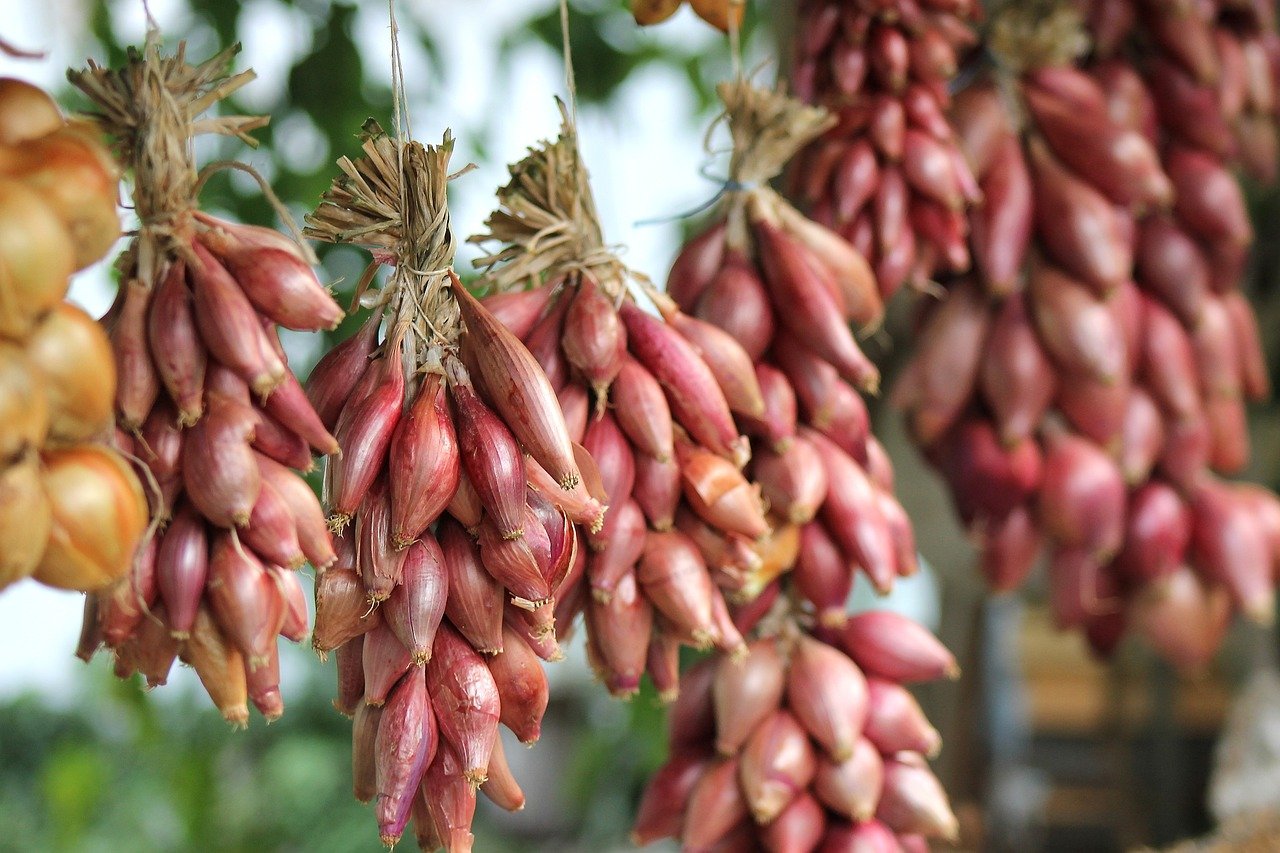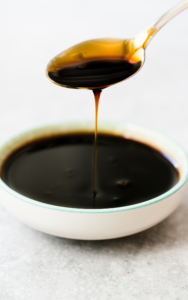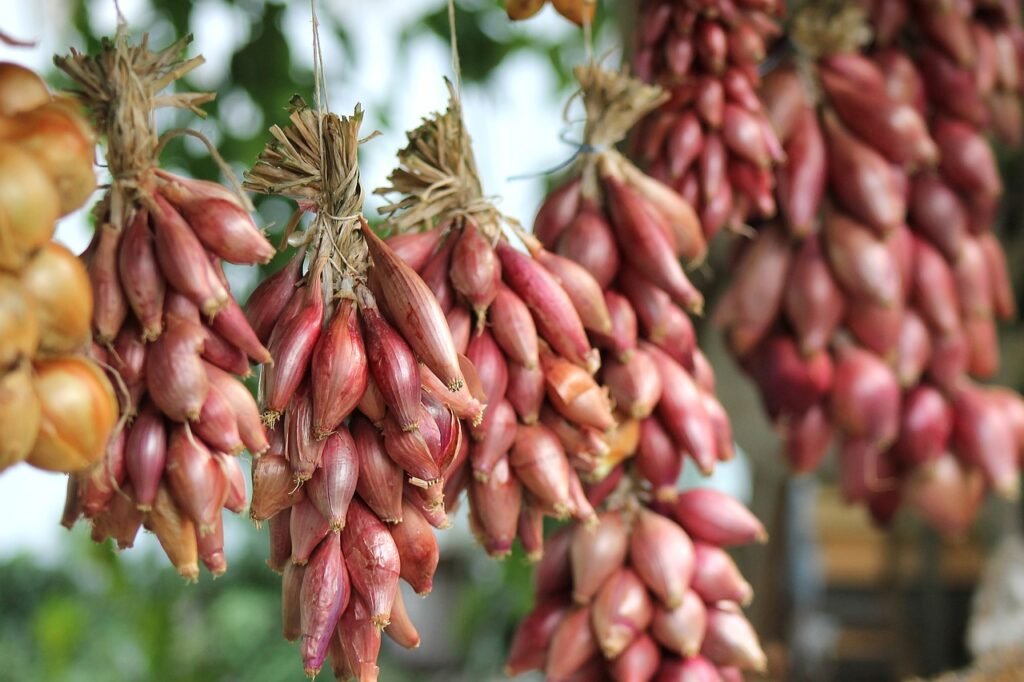
Learning how to store onions is crucial, as they are a staple ingredient in many dishes and can add delicious flavor to any meal.
However, onions can spoil quickly and lose their flavor if not stored correctly. Whether you have a surplus from your garden or simply wish to extend their freshness, knowing the right storage methods is key.
In this blog post, we will discuss the best methods for storing onions to ensure maximum freshness and extend their shelf life.
By keeping it cool, you can enjoy the full flavor and benefits of onions in your cooking for weeks to come.
Understanding the Importance of Proper Onion Storage
Proper onion storage may not be the most exciting topic, but it is an important one if you want to preserve the flavor and quality of your onions.
By understanding the importance of proper onion storage, you can ensure that your onions last longer.
First and foremost, proper storage is essential for maintaining the flavor of your onions.
Onions are known for their strong and distinctive taste, which can greatly enhance the flavor of many dishes.
However, when not stored correctly, onions can lose their flavor and become bland.
By storing onions properly, you can preserve their unique taste and add that extra burst of flavor to your favorite meals.
In addition to flavor, proper onion storage is also crucial for extending their shelf life.
Onions have a relatively long shelf life compared to many other vegetables, but they can still spoil if not stored properly.
When exposed to certain conditions, such as moisture or heat, onions can rot or become moldy, rendering them inedible.
By following the right storage methods, you can prolong the life of your onions and reduce waste.
Another important aspect of proper onion storage is preventing sprouting.
When onions are exposed to warmth or light, they can begin to sprout, resulting in a softer texture and less desirable taste.
By storing onions in the right conditions, you can prevent them from sprouting and ensure that they maintain their firmness and flavor.
Ultimately, understanding the importance of proper onion storage is essential for anyone who loves to cook with onions.
By taking the time to store your onions correctly, you can preserve their flavor, extend their shelf life, and ensure that you always have fresh onions on hand for your culinary creations.
How to Store Onions – Tips for Selecting and Preparing
When it comes to selecting and preparing onions for storage, there are a few key tips to keep in mind.
These tips will ensure that your onions stay fresh and flavorful for as long as possible.
Selection
Firstly, when selecting onions for storage, it’s important to choose ones that are firm and free from any soft spots or bruises.
Onions with soft spots are more likely to spoil quickly, so it’s best to avoid them. Additionally, look for onions that have dry and papery skins.
This indicates that they have been properly cured and will have a longer shelf life.
Preparation
Before storing onions, it’s important to prepare them properly. Start by removing any dirt or debris from the skins.
You can do this by gently wiping them with a damp cloth or paper towel. Avoid washing the onions, as excess moisture can lead to spoilage.
Once the onions are clean, it’s a good idea to trim off any green sprouts or roots.
These parts can contribute to spoilage and should be removed before storage.
However, be careful not to remove too much of the onion’s outer layers, as these layers help to protect the inner layers and maintain freshness.
Ventilation
For longer-term storage, it’s best to keep onions in a cool, dry, and well-ventilated space.
Tips for Selecting and Preparing Onions for Storage Avoid storing them near other produce, as some fruits and vegetables can release ethylene gas, which can cause onions to spoil more quickly.
By following these tips for selecting and preparing onions for storage, you can ensure that your onions stay fresh and flavorful for weeks to come.
So, the next time you buy or harvest onions, be sure to take the extra steps to properly prepare them for storage.
Your taste buds will thank you!
The Ideal Conditions for Storing Onions
To keep your onions fresh and flavorful for as long as possible, it’s important to store them in the ideal conditions.
Cool, Dry and Well Ventilated
The ideal temperature for storing onions is between 32 and 40 degrees Fahrenheit (0 to 4 degrees Celsius).
This temperature range helps to slow down the onion’s metabolic processes, preventing them from spoiling too quickly.
A cool basement or cellar is an excellent location for onion storage.
These areas tend to have a consistent temperature and provide the darkness that onions prefer.
If you don’t have access to a basement or cellar, you can also store onions in a pantry or kitchen cabinet as long as they are away from direct sunlight and heat sources.
It’s important to keep onions in a well-ventilated space to prevent excess moisture buildup.
If onions are stored in a sealed container or plastic bag, the lack of airflow can cause them to rot.
Instead, opt for a mesh bag, wire basket, or an open container that allows for air circulation.
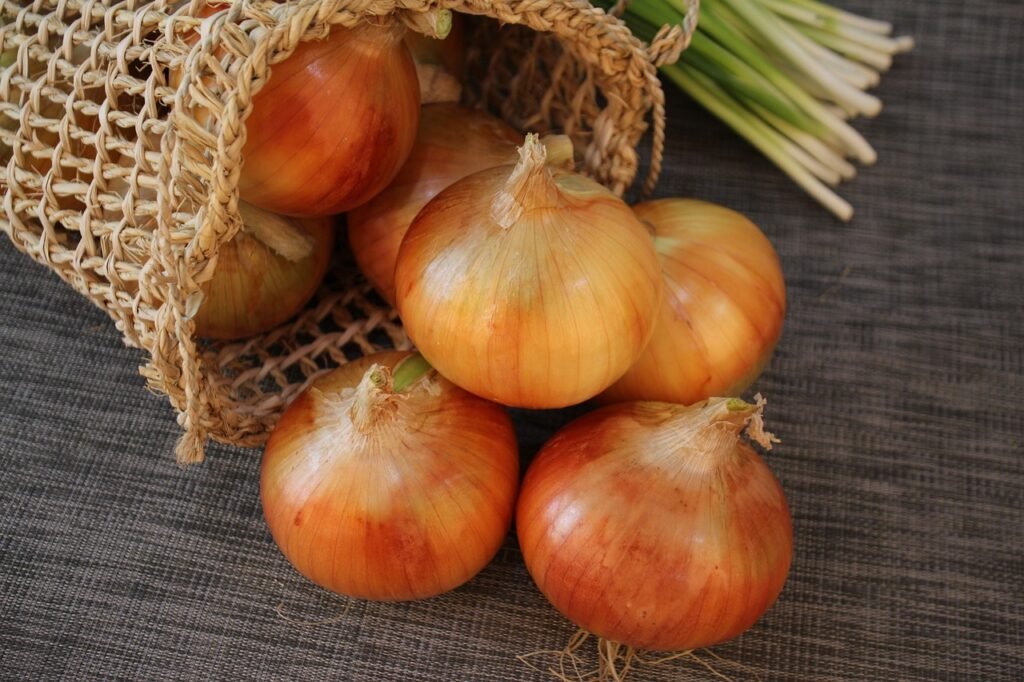
Humidity
Another factor to consider is humidity. Onions prefer low humidity environments, so it’s best to store them in a place with relatively dry air.
High humidity can lead to mold growth or sprouting, which can compromise the quality of the onions.
Separately
Lastly, it’s essential to store onions separately from other produce.
Some fruits and vegetables, such as apples and potatoes, release ethylene gas, which can accelerate the spoiling process for onions.
By keeping onions separate, you can minimize the risk of premature spoilage.
By following these ideal storage conditions, you can ensure that your onions stay fresh and flavorful for a longer period.
So find that cool, dry, and well-ventilated spot in your home and give your onions the perfect home they deserve!
Do’s and Don’ts in Onion Storage
When it comes to storing onions, there are a few do’s and don’ts.
Let’s take a look at some of the key tips for onion storage:
Ideal Temperature
Do store onions in a cool, dry, and well-ventilated space. As mentioned earlier, the ideal temperature range for onion storage is between 32 and 40 degrees Fahrenheit (0 to 4 degrees Celsius).
This helps to slow down the onion’s metabolic processes and prevent spoilage. Additionally, onions prefer low humidity environments, so keep them in a place with relatively dry air.
Remove Debris
Do remove any dirt or debris from the onion skins before storing them.
Gently wipe the onions with a damp cloth or paper towel to clean them. Avoid washing the onions, as excess moisture can lead to spoilage.
Trim
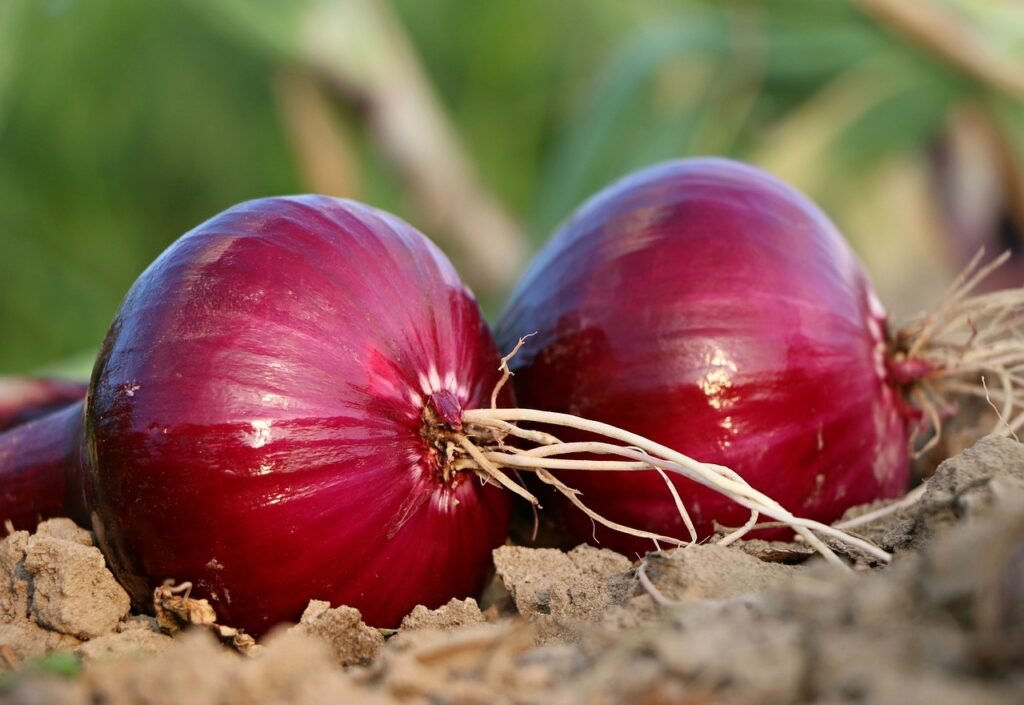
Do trim off any green sprouts or roots before storage. These parts can contribute to spoilage and should be removed to maintain freshness.
Be careful not to remove too much of the onion’s outer layers, as these layers help protect the inner layers.
Isolate
Don’t store onions near other produce. Some fruits and vegetables, such as apples and potatoes, release ethylene gas, which can cause onions to spoil more quickly.
Keep onions separate to minimize the risk of premature spoilage.
Don’t store onions in a sealed container or plastic bag.
Onions need airflow to prevent excess moisture buildup. Instead, opt for a mesh bag, wire basket, or an open container that allows for air circulation.
By following these do’s and don’ts, you can ensure that your onions stay fresh and flavorful for a longer period of time.
So remember, keep it cool, clean, and well-ventilated to make the most of your onion storage. Your taste buds will thank you!
Common Mistakes to Avoid when Storing Onions
When it comes to storing onions, there are a few common mistakes that can easily be avoided.
By knowing what not to do, you can ensure that your onions stay fresh and flavorful for longer.
Here are some common mistakes to avoid when storing onions:
1. Storing onions near other produce:
As mentioned earlier, some fruits and vegetables release ethylene gas, which can accelerate the spoiling process for onions.
It’s best to keep onions separate from other produce to minimize the risk of premature spoilage.
2. Storing onions in a sealed container or plastic bag:
Onions need airflow to prevent excess moisture buildup. Storing them in a sealed container or plastic bag can lead to rotting or mold growth.
Instead, opt for a mesh bag, wire basket, or an open container that allows for air circulation.
3. Not removing dirt or debris from the onion skins:
Before storing onions, it’s important to clean them by gently wiping off any dirt or debris from the skins.
Avoid washing the onions, as excess moisture can lead to spoilage.
4. Not trimming off green sprouts or roots:
Green sprouts and roots can contribute to spoilage and should be removed before storage.
Be careful not to remove too much of the onion’s outer layers, as they help protect the inner layers and maintain freshness.
5. Storing onions in a warm or humid environment:
Onions prefer cool, dry, and well-ventilated spaces.
Storing them in a warm or humid environment can lead to sprouting, mold growth, or spoilage.
It’s best to find a cool and dry spot in your home, like a basement or cellar, for onion storage.
By avoiding these common mistakes, you can ensure that your onions stay fresh and flavorful for a longer period.
Proper storage is key to enjoying the full flavor and benefits of onions in your cooking.
So, remember to keep it cool, clean, and well-ventilated to make the most of your onion storage.
Your taste buds will thank you!

The Shelf-Life of Stored Onions
Once you have properly stored your onions, you may be wondering just how long they will stay fresh.
The shelf-life of stored onions can vary depending on various factors, such as the type of onion, storage conditions, and how well they were prepared for storage.
On average, stored onions can last anywhere from 2 to 3 months.
Yellow onions, which are the most common variety, tend to have a longer shelf-life compared to other types of onions.
They can stay fresh for up to 3 months when stored properly.
Red onions have a slightly shorter shelf-life, lasting around 1 to 2 months.
Sweet onions, such as Vidalia or Walla Walla onions, are more delicate and have a shorter shelf-life of about 1 month.
The key to maximizing the shelf-life of your stored onions is to maintain the ideal storage conditions.
As mentioned earlier, onions prefer cool, dry, and well-ventilated spaces.
Keep them away from direct sunlight, heat sources, and other produce.
By storing onions in a cool basement or cellar with a temperature range of 32 to 40 degrees Fahrenheit (0 to 4 degrees Celsius), you can prolong their freshness.
It’s important to regularly check your stored onions for any signs of spoilage, such as mold growth, soft spots, or an unpleasant odor.
Remember, proper storage and regular inspection are key to maximizing the shelf-life of your stored onions.
By following these guidelines, you can enjoy the full flavor and benefits of onions in your cooking for several months.
So, go ahead and stock up on onions knowing that they can stay fresh and delicious for an extended period!
Creative Storage Solutions for Onions
Finding creative storage solutions for onions can help you make the most of your space while keeping your onions fresh and flavorful:
1. Hanging Onion Baskets:
Consider hanging baskets or mesh bags in a cool, dry area of your kitchen or pantry.
This not only provides proper airflow for your onions but also adds a rustic and charming touch to your space.
2. Onion Storage Crates:
Use wooden crates or bins with slatted sides to store your onions. This allows for air circulation and keeps them organized.
You can stack multiple crates to maximize storage space while keeping your onions easily accessible.
3. Onion Braiding:
If you have a surplus of onions, try braiding them together using their green tops.
This not only provides a visually appealing storage solution but also helps to keep them fresh.
Hang your braided onions in a cool, dry place away from direct sunlight.
4. Mason Jars:
For a smaller onion collection, mason jars can be a great option.
Slice your onions into thin rings or chop them into smaller pieces and store them in clean, dry mason jars.
This not only keeps them organized but also makes it easy to see how many onions you have left.
5. Repurposed Containers:
Get creative with repurposing containers for onion storage.
Old pantyhose or mesh produce bags can be hung and used to store onions.
You can also use egg cartons or cardboard tubes from paper towels to store individual onions and prevent them from touching one another.
Remember, no matter which storage solution you choose, make sure to keep your onions in a conducive place.
So, get creative and find the perfect storage solution for your onions!
By following the tips and guidelines in this blog post, you can ensure that your onions stay fresh and flavorful for longer periods of time.
Regrowing Onions at Home: A Sustainable Solution
Did you know you can regrow onions at home, including green onions, with minimal effort? This simple and sustainable gardening hack not only saves you money but also ensures you have a fresh supply of onions and green onions year-round. Here’s how to do it:
How to Regrow Bulb Onions
- Save the Root End: After slicing an onion, save the root end (about 1 inch from the bottom).
- Prepare the Soil: Fill a pot with nutrient-rich soil or designate a spot in your garden with good drainage.
- Plant the Root: Place the root end in the soil, roots facing down, and lightly cover it with soil.
- Water and Care: Keep the soil moist but not soggy. Place the pot in a sunny spot or ensure your garden gets adequate sunlight.
- Harvest: After a few weeks, green shoots will emerge, and the onion will start growing. Once mature, you can harvest it and repeat the process!
How to Regrow Green Onions
- Save the Stalk Base: Keep the white base of your green onions with the roots intact.
- Use a Glass of Water: Place the green onion bases in a glass of water, ensuring the roots are submerged and the tops are above water.
- Change the Water: Replace the water every 2-3 days to keep it fresh and prevent mold.
- Harvest the Shoots: In just a few days, you’ll notice new green shoots growing. Snip off the tops as needed for cooking while leaving the roots intact.
- Plant in Soil (Optional): For longer-lasting growth, transfer the green onions to soil after they’ve regrown a few times in water.
Why Regrow Onions and Green Onions?
- Sustainability: Reduce kitchen waste by reusing scraps.
- Convenience: Always have fresh onions or green onions on hand for your recipes.
- Cost Savings: Spend less on groceries while enjoying home-grown produce.
Whether you’re regrowing onions in water or planting them in soil, this simple trick is perfect for beginners and seasoned home gardeners alike. Start today and enjoy the satisfaction of regrowing your kitchen staples!
Related Articles:
How Long to Boil Sweet Potatoes for That Fluffy, Creamy Texture
Confused about Canola Oil vs Vegetable Oil? Here’s What You Need to Know
Let’s Talk About It: The Big Question – Are Oreos Vegan?
“As an Amazon Associate, I earn from qualifying purchases.”

